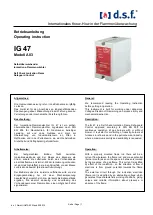
Page
xxxvi
IB131021EN
Effective Mar 2018
per the instructions in Section 5.2.2. If the wipe or open
gap is out of the specified range, adjust the pole unit per the
instructions in Section 5.2.2. Save the final wipe and open
gap measurements on each phase in maintenance records.
WARNING
FAILURE TO REPLACE A POLE UNIT ASSEMBLY
WHEN CONTACT EROSION EXCEEDS MAX LIMIT OR
WHEN WIPE IS UNSATISFACTORY, WILL CAUSE THE
BREAKER TO FAIL TO INTERRUPT AND THEREBY
CAUSE PROPERTY DAMAGE OR PERSONAL INJURY.
6-6
INSULATION
Type VCP-WL Circuit Breaker insulation maintenance
primarily consists of keeping all insulating surfaces clean.
This can be done by wiping off all insulating surfaces with a
dry lint free cloth or dry paper towel. In case there is any
tightly adhering dirt that will not come off by wiping, it can
be removed with mild solvent or distilled water. Be sure that
the surfaces are dry before placing the circuit breaker in
service. If a solvent is required to cut dirt, use Stoddard’s
Solvent Eaton 55812CA or commercial equivalent.
Secondary control wiring also requires inspection for
insulation damage.
6-7
INSULATION INTEGRITY CHECK
Primary Circuit:
The integrity of primary insulation may be checked by the
60Hz AC power frequency withstand voltage test. The test
voltage depends upon the maximum rated voltage of the
breaker. For the breaker elements rated 4.76 kV, 8.25 kV,
and 15 kV the test voltages are 19 kV, 36kV, and 36 kV
RMS respectively. Conduct the test as follows:
Close
the breaker.
Connect
the
high potential lead of the
test machine to one of the poles of the breaker.
Connect
the remaining poles and breaker frame to ground.
Start
the
machine with output potential at zero and increase to the
test voltage.
Maintain
the test voltage for one minute.
Repeat
for the remaining poles. Successful withstand
indicates satisfactory insulation strength of the primary
circuit.
If a DC high potential machine is used, make certain that
the peak voltage does not exceed the peak of the
corresponding AC rms test voltage.
Secondary Circuit:
Connect all points of the secondary disconnect pins with
wire. Connect this wire to the high potential lead of the test
machine. Ground the circuit breaker frame. Starting with
zero, increase the voltage to 125 volts rms, 60 Hz.
Maintain the voltage for one minute. Successful withstand
indicates satisfactory insulation strength of the secondary
control circuit. Remove the shooting wire.
6-8
PRIMARY CIRCUIT RESISTANCE CHECK
Since the main contacts are inside the vacuum chamber,
they remain clean and require no maintenance at any time.
Unlike many typical circuit breaker designs, VCP-WL
breakers do not have sliding contacts at the moving stem
either. Instead they use a highly reliable and unique
flexible clamp design that eliminates the need for
lubrication and inspection for wear.
If desired, the DC resistance of the primary circuit may be
measured as follows: close the circuit breaker, pass at
least 100 amps DC current through the circuit breaker.
With a low resistance instrument, measure resistance
across the studs on the circuit breaker side of the
disconnects for each pole. The resistance should not
exceed the values shown in Table
6.3.
Table 6.3 Typical Resistance Measurements
Rated Continuous





































